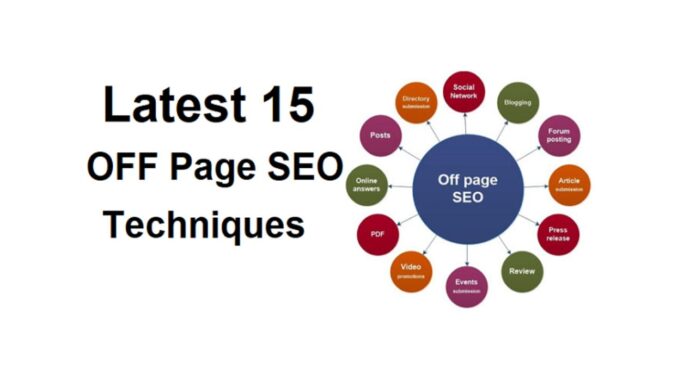Off-page optimization in SEO refers to activities conducted outside a website to improve its search engine rankings. This includes building quality backlinks, social media engagement, and other external factors that enhance a site’s credibility and visibility on search engines.
What Is Off-Page SEO
The term “off-page SEO” (sometimes known as “off-site SEO”) refers to activities done outside your website that affect how people discover and engage with your content and how you rank in search engine result pages (SERPs). When utilized in conjunction with technical SEO and on-page SEO, off-page Optimization may assist you in achieving your goals for search visibility, crawling, indexing, traffic, and conversions.
Why Off-Page SEO Is Important

“Off-page SEO” refers to the actions of your website to improve its ranking in search engine results pages (SERPs). This includes techniques like link building, social media marketing, and guest posting.
Off-page SEO is crucial since it contributes to your website’s authority and reputation building.
Off-page SEO may also help your website generate more leads and visitors. When visitors see connections to your website on other reputable websites, they are likelier to visit and interact with your content.
What Is The Benefits Of Off-Page SEO
- It might aid in expanding the exposure and audience of your website.
- Your visitors may assist in establishing credibility and trust.
- The social media engagement on your website may go up as a result.
- More organic traffic to your website may result from it.
Off-page SEO strategies should be considered if you are serious about raising the SERP rating of your website.
Off-Page SEO vs. On-Page SEO
Off-page SEO refers to when your website is discussed elsewhere on the internet as opposed to on-page SEO, which is the optimization of your website.
Off-page SEO
It is an endeavour to increase your site’s authority and position by constructing links and ratings (for instance, through influencer or social media marketing). You do not influence your website’s SEO.
On-page SEO
It is the process of optimizing certain elements on your website, such as internal linking and keyword usage, to improve your ranking for targeted keywords. You have some power over on-page SEO.
Off-page SEO Examples
Link building, social media marketing, guest posting.
On-page SEO Examples
Keyword research, title tag optimization, meta description optimization.
The main distinction between on-page and off-page SEO is that Google utilizes on-page SEO to gauge your website’s relevance while using off-page SEO to gauge your page’s authority.
On-page and off-page SEO are essential for your website to rank better in search engine results pages. However, off-page SEO could take longer to show results.
For the greatest results, it’s crucial to concentrate on both on-page SEO and off-page SEO.
Three Main Types of the Links for Off-Page SEO
To achieve off-page SEO, links are essential. Understanding the various sorts of connections and the variables affecting the equity of a link to your website is crucial before you begin generating or earning backlinks.
Natural Links
These are links that were acquired naturally, without your involvement. They are the most important links since search engines view them as a badge of trust and authority.
Built Links
You have to work to get these links. You can accomplish this by posting as a guest, participating in link roundups, or contacting other websites to request links.
Self-created Links
You build these links on your website. Although less beneficial than natural connections, they can help you rank higher.
There are a few more sorts of connections that you could encounter in addition to these three basic categories, like:
No Follow Links
These links do not directly affect your score since search engines do not follow them. However, they can still be useful for social media engagement and branding.
Do Follow Links
These links might raise your rating because search engines take them into account. To achieve the greatest results, it is necessary to obtain do-follow links from authoritative domains.
UGC Links
Users establish these connections, for example, in forum posts or comments on social media. Although they don’t have the same value as links from other websites, they can help you rank higher.
Your unique situation and goals will determine the ideal form of link for you. Natural connections are the ideal option if you are starting. You may concentrate on creating links as your authority grows. Regardless of the sort of links you concentrate on, it is crucial to obtain connections from high-quality websites.
How To Get High-Quality Links

Build High-quality Content:
The most crucial action you can take to obtain high-quality connections is this. People naturally want to connect to your material if it is worthwhile and insightful.
Guest Post on Relevant Websites
Guest posting is a wonderful technique for obtaining backlinks from authoritative websites. When you guest post, you effectively allow someone else to market your material to their audience.
Participate in Link Roundups
Links to additional pertinent information are gathered in link roundups. Participating in a link roundup gives you access to a larger audience and the chance to receive a backlink from the website hosting the roundup.
Reach Out to other Websites and Ask for a Link
Even though it takes time, this method may be quite successful. When contacting them, customize your letter and outline why the other website will benefit from your material.
Create Relationships with Other Bloggers and Website Owners
Although this is a long-term approach, it may be quite successful.
Be patient in addition to following these suggestions. High-quality connections require time and effort. Expect to see results later. If you keep producing excellent material, developing connections, and contacting other websites, you will soon start to get the results you are aiming for.
9 Off-Page SEO Techniques For Website Page Optimization
Build Backlinks
Backlinks are connections to your website made by other websites. They rank among the most significant off-page SEO elements.
Get Social Media Mentions
Mentions on social media occur when someone talks about your website or business. They can help expand the visibility and audience of your website. You may promote social media mentions by producing shareable content and using pertinent hashtags.
Get Featured in Directories
Websites that list companies and organizations are called directories. Getting your website included in directories can increase its exposure and audience. You may submit your website to a variety of directories.
Get Social Media Mentions
Local business listings are available on search engines like Google and Bing. When people are looking for companies in your region that are similar to yours, having your website mentioned in these listings can help them locate your company.
Press Coverage
When your website or company gets referenced in the news, a magazine, or a newspaper, that is known as press coverage. Your website’s reputation and authority may be enhanced. Press coverage may be obtained through press releases, approaching journalists with story ideas, and going to trade shows.
Involved in Online Communities
Forums, groups, and other online communities are venues where people may connect. Participating in online forums can help you develop connections with possible partners and clients. You can also get active in online communities by participating in debates, responding to queries, and imparting your expertise.
Obtain Expertise
To establish oneself as an authority in your profession, publish books, deliver keynote addresses at gatherings, and produce articles.
Social Media Marketing
Promoting your website and content on social media networks is known as social media marketing. It may also promote your content, allowing you to reach a broader audience.
Additionally, it provides an avenue to interact with new clients and engage with your audience more personally. As a result, social media marketing can effectively increase website traffic and foster a sense of community around your brand.
Run Paid Advertising Campaigns
You can increase the number of people who see your website by using paid advertising campaigns. You may execute various sponsored advertising initiatives, including social media advertising and search engine marketing (SEM).
Conclusion
Off-page SEO is crucial for building a website’s authority and reputation online. It boosts a site’s credibility, exposure, and search engine rankings within its speciality or sector.
FAQ
What are Some Common Off-page Optimization Techniques?
Web Link building, social media marketing, influencer outreach, content marketing, online reputation management, and guest blogging are typical off-page Optimization strategies in SEO.
What are Backlinks, and How Do They Impact SEO?
Backlinks- inbound links to your website from other websites- play a pivotal role in SEO. These links are crucial in influencing search engines to view your website as reliable and authoritative.
As a result, they significantly impact your website’s search engine rankings and overall SEO performance.
What is Social Media Marketing’s Role in Off-page SEO?
Backlinks are external websites linking backing to your website. They affect SEO by making search engines believe your website is reliable and authoritative. Your results may rise as a result of high-quality backlinks.
Is Off-page Optimization More Important than On-Page Optimization?
A thorough SEO plan must include both on-page and off-page optimization. They are very important to one another, and your website’s particular objectives and level of competition determine their significance.
How can I Measure the Success of Off-page Optimization Efforts?
Numerous indicators, such as increased organic traffic, better search engine ranks, the number of high-quality backlinks attained, and social media engagement, can be used to gauge the effectiveness of off-page SEO.



